PHUKET: Here's the transcript of an interview broadcast yesterday across Australia and the region through Radio Australia. Phuketwan editor Alan Morison is talking to Presenter Sen Lam on the popular weekly show, 'Asia Pacific.'
AN UNPRECEDENTED criminal defamation lawsuit against Australian journalist Alan Morison and his Thai colleague will be heard in a Phuket court on Thursday The prosecution of Alan Morison and his colleague Chutima Sidasathian will proceed, despite calls by the United Nations and rights groups for the charges to be dropped.
The Thai navy last year launched legal action against Mr Morison and Ms Chutima, for republishing copy from Reuters news agency, which alleged members of the Thai military were involved in the trafficking of Rohingya asylum-seekers from Myanmar (Burma).
If convicted, both journalists could face up to seven years in jail.
MORISON: We've done absolutely nothing wrong. All we've done is republished one paragraph from the Reuters newsagency, and in that paragraph a human trafficker is quoted as making some allegations about the military along the coast north of Phuket. The Royal Thai Navy isn't specifically mentioned in the paragraph, and both Phuketwan and Reuters have gone out of their way to try to make sure that we don't make accusations that we don't have evidence for. The whole case really revolves around a very bad translation of the paragraph that we carried in English into Thai, whereas the Royal Thai Navy isn't mentioned in the English version, the translators have managed to insert the Royal Thai Navy three times into the Thai version.
LAM: Phuket's Public Prosecutor has said that there is enough evidence to proceed with the case, do you find that concerning?
MORISON: I think the Phuket Public Prosecutor is looking at it from a very narrow perspective. All around the world every day various outlets, including the ABC, carry items that are based on newsagency copy, thousands and thousands of them. Now if every outlet was to have to check every newsagency for their source for their accuracy, the whole news media industry would become much slower in operation. We actually called the navy to try to check the paragraph that they're complaining about, and the navy as usual was not available. What we have in Thailand is a silent and secret armed force that doesn't respond to questions very often, this is because the issue of the Rohingya is such a problem for them and we've been exposing that issue consistently for seven years.
LAM: As you say you've taken care not to level accusations against the Thai Navy. What's your understanding of why the Thai authorities are pursuing this case?
MORISON: It's a trumped up charge and it's designed to put Phuketwan out of business, it's as simple as that, because for seven years we've been exposing what's been happening off Thailand and inside Thailand for the Rohingya boat people who come down looking for sanctuary and find themselves in the arms of human traffickers. They are treated appallingly at every level.
LAM: If convicted you and your colleague face up to seven years in jail. What legal support have you been getting in your case?
MORISON: The support has been marvellous really, we have several Thai legal activist organisations who have volunteered to help, we couldn't complain about the level of support within Thailand. Internationally the support has been remarkable, everyone from the UN down has seen this problem of the military suing the media in a democracy. We've been writing about the Rohingya for seven years and the military has shown a professional approach up until December when the Royal Thai Navy decided to do something about it.
LAM: The newsagency Reuters that after all has won a Pulitzer Prize out of this Rohingya coverage, they've not spoken out in your defence either, does that surprise you?
MORISON: Well we were delighted that Reuters won the Pulitzer because of the awareness it creates for the Rohingya issue, and we congratulate them. But my colleague Chutima Sidasathian worked with Reuters in that series and guided Reuters reporters to many of the contacts that she's built up over seven years in Thailand covering the story. And the paragraph after all is a Reuters paragraph that we've merely republished. It really is time Reuters said something about media freedom in Thailand.
LAM: In the past you've spoken of your disappointment at the level of support from Australian authorities. Is that still the case, should Canberra be doing more?
MORISON: It would be pleasant if somebody in the government actually spoke out about the need for media freedom in a democracy, but with the navy involved in this incident and with the navy in Australia also involved in incidents with the media, it seems the government is reticent to speak out about the principle, which I think is a little bit sad. However the embassy has been fully supportive and will be monitoring our appearance in court later today.
LAM: What's likely to be the outcome of Thursday's court hearing, what are you expecting from it?
MORISON: We're unsure really, we've said that we won't pay bail and would prefer to go to jail, but in fact some of our supporters are so concerned about us that they may well pay the bail on our behalf. So it may just be an arraignment where we plead and where the judge adjourns the matter for some other day. And we would hope that in the interim at some point the navy comes to its senses and the charge, the charges are dropped.
Phuketwan is marking the 30-day countdown to the 30th anniversary of the World Media Freedom Day on May 3 with news outlets around the world.
UPDATE: Morison and Khun Chutima were freed on bail but forced to spend five hours in holding cells beneath Phuket Provincial Court. Morison's passport was taken. The pair reappear on May 26.
Dear Mr. Morison,
We recently read a transcript of your interview on Radio Australia in Phuketwan regarding the recent legal actions. You are quoted as saying "It really is time that Reuters said something about media freedom in Thailand."
Reuters would like to offer this statement:
"We support the principles of a free press everywhere in the world - and the rights of journalists to go about their jobs without fear or hindrance in reporting the truth."
If you use that statement, please attribute it to "a Reuters spokesperson."
(Name and address supplied)
Hello,
Perhaps I should have made it plainer that a ''motherhood'' statement was not being sought, nor is it an appropriate response to this particular case at this time. Having just spent five hours in a Thai cell with 90 others, I now, more than ever, want to see justice done in this matter. Reuters has had four months to defend media freedom in the context of the action now being taken by the Royal Thai Navy under Thailand's reprehensible laws. I don't think it's too strong to say that Reuters has cut and run on this issue, leaving the small guys to take the rap. Judging from reports in the Thai language newspapers yesterday, more and more people are finding the lack of action and comment by Reuters as reprehensible as the misguided suit by the Royal Thai Navy. Both organisations are essentially good organisations (marketers, this is another word for ''brands'') but in this particular incident, both the Navy and Reuters are placing their reputations above a clear moral and ethical imperative to choose between right and wrong. Do I need to dig out the Reuters guide to ethics for journalists, and quote you from it? I am sure there will be something there about the need to avoid self-interest at all times. Some American journalists are doubtless already looking at their own Special Reports. I am surprised that astute people fail to understand a predicament of their own making. Reuters deserves respect and its Pulitzer but in this associated case, you've done the wrong thing. Best to admit the error of judgement, speak out publicly about the real issues, and move on. Debating whether Khun Chutima's contribution was intrinsic or incidental completely misses the point. You needed to speak out in defence of media freedom in Thailand in December.You should have spoken out four months ago. It's now high time, as Pulitzer winners, to say something meaningful, before it's too late.
The contributor below on CNN speaks for a growing number.
cheers,
Alan Morison.
Duane A. Donecker
All you have to do is look at Thailand's ranking on the Reporters Without Borders ranking, 150 out of 180 [we think it's actually 130] so as you can see they are not a true free country when it comes to the press. I can't believe that Reuters is trying to distance itself from Chutima and make a it a point to let the reading public know that she had nothing to do with them winning the Pulitzer Prize, who cares if she made appointments or made your beds she is a part of your team and Reuters should be there helping the two of them.
Now that it is in the international press I'm sure the Thai navy will back off, they are kind of like Malaysia they have free press as long as it isn't criticizing any branch of the government.
In many ways Thailand is a free country, for example recent demonstrations and sit ins to get rid of the current Prime Minister, although nations such as the United States, United Kingdom, Canada and Australia for example would never get away with using the force the government of Thailand has at times.
The main thing is I think this won't go any farther and if the Thai Navy believes they been wronged then they should take them to civil court and not criminal court.

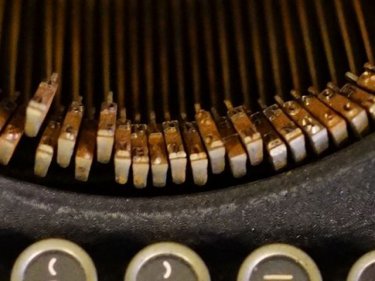

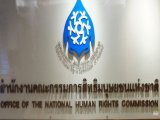

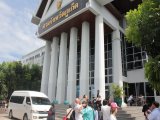

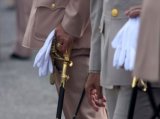
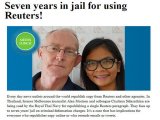

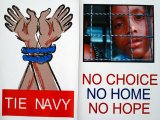







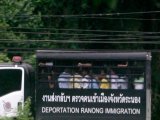




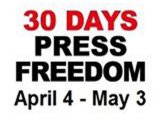
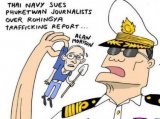
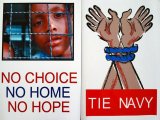

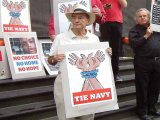




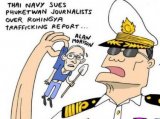
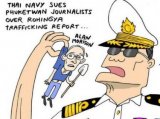
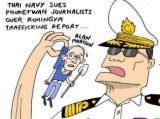
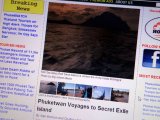




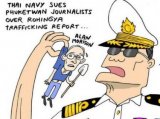


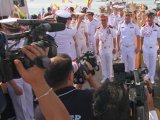




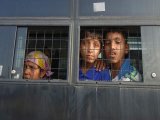








I see that you spoke with Reuters: "I still feel defiled in my professional capacity as a journalist by the whole thing ... It's more than an indignation to spend more than four hours in jail," Morison told Reuters.
Did you give them a piece of your mind for not giving you support or ask them for support in future?
It's good to see that many international publications are reporting on the case which could do you some good by greatly embarrassing both the Navy and Thailand, leading the prosecutor to drop the case.
It is also disturbing to see that you were held in a prison block for five hours with the likes of Kata Beach Bum and other serious offenders, so where does the presumption of innocence come into a case such as this? Such a system seems to have overtones of North Korea or Zimbabwe.
Posted by Pete on April 18, 2014 13:44
Editor Comment:
There is no presumption of innocence in Thailand. In this case, the police should have looked more closely at what the Navy was presenting to them. They did not. Then the prosecutor's office should have looked more closely at what the police were presenting to them. They did not. Phuketwan was charged over a mistranslated Reuters paragraph. Reuters has yet to the charged. The issue now is a no-win situation for Thai authorities - do they charge Reuters over their Pulitzer winning paragraph? Or do they continue to persecute Phuketwan for republishing Reuters' Pulitzer paragraph? It appears common sense may possibly be forcing its way into the equation any minute now.